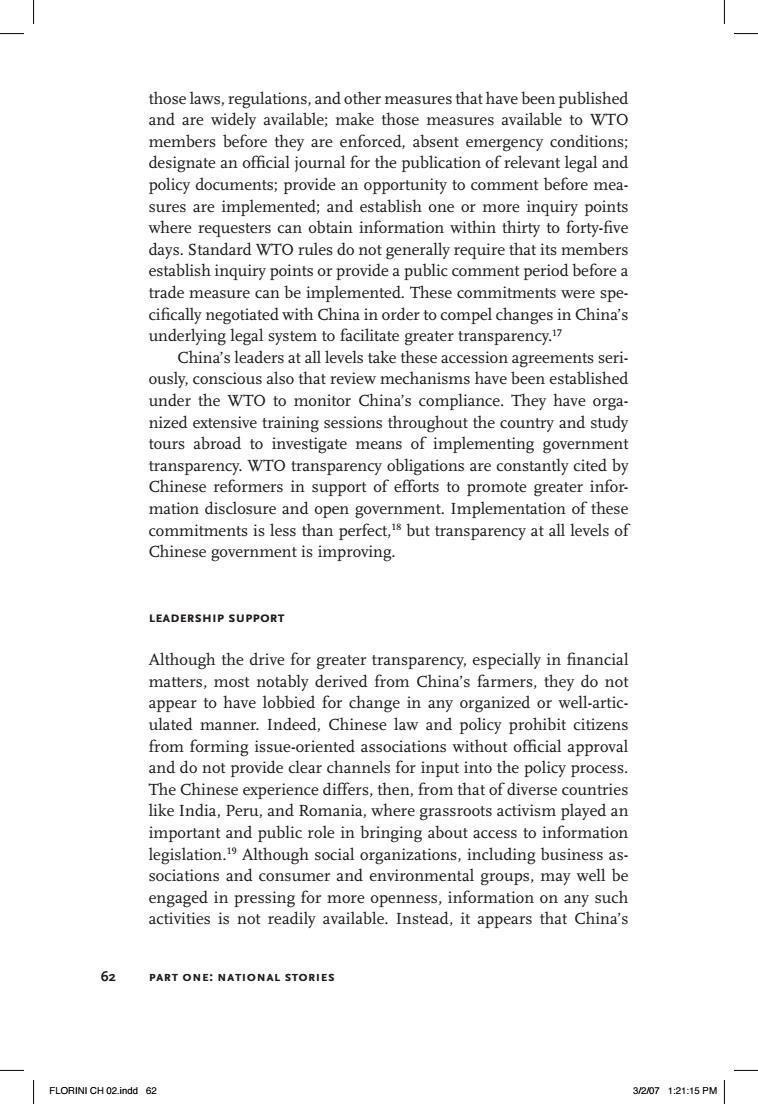正在加载图片...

those laws,regulations,and other measures that have been published and are widely available;make those measures available to WTO members before they are enforced,absent emergency conditions; designate an official journal for the publication of relevant legal and policy documents;provide an opportunity to comment before mea- sures are implemented;and establish one or more inquiry points where requesters can obtain information within thirty to forty-five days.Standard WTO rules do not generally require that its members establish inquiry points or provide a public comment period before a trade measure can be implemented.These commitments were spe- cifically negotiated with China in order to compel changes in China's underlying legal system to facilitate greater transparency.17 China's leaders at all levels take these accession agreements seri- ously,conscious also that review mechanisms have been established under the WTO to monitor China's compliance.They have orga- nized extensive training sessions throughout the country and study tours abroad to investigate means of implementing government transparency.WTO transparency obligations are constantly cited by Chinese reformers in support of efforts to promote greater infor- mation disclosure and open government.Implementation of these commitments is less than perfect,s but transparency at all levels of Chinese government is improving. LEADERSHIP SUPPORT Although the drive for greater transparency,especially in financial matters,most notably derived from China's farmers,they do not appear to have lobbied for change in any organized or well-artic. ulated manner.Indeed,Chinese law and policy prohibit citizens from forming issue-oriented associations without official approval and do not provide clear channels for input into the policy process. The Chinese experience differs,then,from that of diverse countries like India,Peru,and Romania,where grassroots activism played an important and public role in bringing about access to information legislation.19 Although social organizations,including business as- sociations and consumer and environmental groups,may well be engaged in pressing for more openness,information on any such activities is not readily available.Instead,it appears that China's 62 PART ONE:NATIONAL STORIES FLORINI CH02.indd 62 3/2071:21:15PM62 part one: national stories those laws, regulations, and other measures that have been published and are widely available; make those measures available to WTO members before they are enforced, absent emergency conditions; designate an official journal for the publication of relevant legal and policy documents; provide an opportunity to comment before measures are implemented; and establish one or more inquiry points where requesters can obtain information within thirty to forty-five days. Standard WTO rules do not generally require that its members establish inquiry points or provide a public comment period before a trade measure can be implemented. These commitments were specifically negotiated with China in order to compel changes in China’s underlying legal system to facilitate greater transparency.17 China’s leaders at all levels take these accession agreements seriously, conscious also that review mechanisms have been established under the WTO to monitor China’s compliance. They have organized extensive training sessions throughout the country and study tours abroad to investigate means of implementing government transparency. WTO transparency obligations are constantly cited by Chinese reformers in support of efforts to promote greater information disclosure and open government. Implementation of these commitments is less than perfect,18 but transparency at all levels of Chinese government is improving. leadership support Although the drive for greater transparency, especially in financial matters, most notably derived from China’s farmers, they do not appear to have lobbied for change in any organized or well-articulated manner. Indeed, Chinese law and policy prohibit citizens from forming issue-oriented associations without official approval and do not provide clear channels for input into the policy process. The Chinese experience differs, then, from that of diverse countries like India, Peru, and Romania, where grassroots activism played an important and public role in bringing about access to information legislation.19 Although social organizations, including business associations and consumer and environmental groups, may well be engaged in pressing for more openness, information on any such activities is not readily available. Instead, it appears that China’s FLORINI CH 02.indd 62 3/2/07 1:21:15 PM